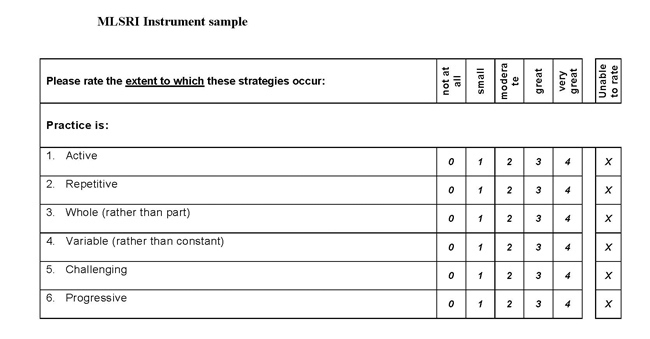The Motor Learning Strategy Rating Instrument
In Brief © Danielle Levac, 2012
What is the Motor Learning Strategy Rating Instrument?
The Motor Learning Strategy Rating Instrument (MLSRI) is an observer-rated instrument that measures the extent to which physiotherapists use motor learning strategies during physiotherapy interventions for children with acquired brain injury (ABI). Motor learning strategies are based in theory and evidence. They can be applied by therapists to structure how the learning task is presented and organize the environment in ways that may promote motor learning. (View the Motor Learning Strategy Clinical Decision-Making Process here.) Motor learning is a major goal of physiotherapy interventions for children with neurodevelopmental disabilities. Therapists target motor learning when they help children learn skills in ways that can be transferred to real life activities. Using the MLSRI, a trained rater evaluates the extent to which 33 motor learning strategies are observed within a videotaped physiotherapy intervention session, using a scale of 'not at all' observed to 'a very great extent.'
The 'practice' category of the instrument is shown here:

Why was it developed?
Motor learning strategy use is encouraged within evidence-based practice, yet little is known about whether or how these strategies are employed within pediatric physiotherapy interventions. Other measurement instruments exist which include components related to motor learning. However, a new instrument rooted in the many theoretical approaches underlying motor learning and relevant to current interventions, such as the use of interactive virtual reality video games, is required. The MLSRI can be used to describe the content of clinical practice, evaluate change in practice, or compare between different intervention methods.
How was it developed?
The MLSRI was developed using an iterative validity process involving motor learning experts and therapists experienced in treating children and youth with ABI. Videotaped physiotherapy intervention sessions were used in the process of developing and refining the items and the rating scale.
How has it been evaluated?
The MLSRI has been evaluated for inter-rater and intra-rater reliability in a small sample of videotaped intervention sessions for children and youth with ABI. It has been evaluated in both 'typical' interventions and in interventions that involve the use of the virtual reality video game system the Nintendo Wii.
How can it be used by clinicians and researchers?
At present, clinicians and researchers can use the motor learning strategy clinical decision-making model to inform teaching and knowledge translation initiatives related to informing students and therapists about the use of strategies in clinical practice. The MLSRI is currently being evaluated in ongoing research that will continue to explore its psychometric properties, and rater training materials will be developed in an easily accessible on-line format to facilitate use by clinicians.
What's next?
Findings from these studies will inform further development of the instrument items and of rater training materials. The MLSRI will undergo further validity and reliability evaluations in both ABI and other populations of children and youth with neurodevelopmental impairments.
Key references
Levac D, Missiuna C, Wishart L, DeMatteo C, Wright V. (2011). Documenting the content of physical therapy for children with acquired brain injury: Development and validation of the Motor Learning Strategy Rating Instrument. Physical Therapy, 91(5):689-99
Kamath T, Banerjee P, Hunter T, Ito J, Pfeifer M, Salbach N, Wright V, and Levac D. (In press). Reliability of the Motor Learning Strategy Rating Instrument for children and youth with Acquired Brain Injury. Physical and Occupational Therapy in Pediatrics.
For more information, please contact: Danielle Levac, PT, PhD, dleva2@uottawa.ca
